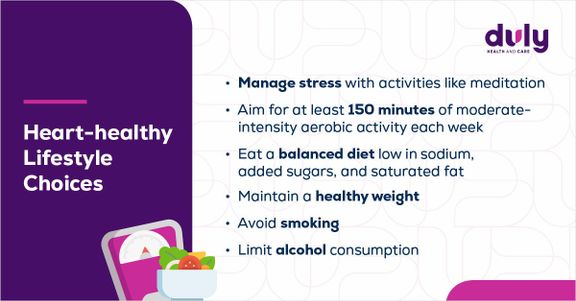Throughout your life, your heart is always putting in work. This crucial organ is constantly moving blood throughout your body, supporting your body as it grows and changes as you get older.
But just because your heart is a constant doesn’t mean how you take care of it stays the same. Your heart’s needs change as you age, and there are special considerations to keep in mind for times like during pregnancy or menopause.
No matter what stage of life you may be in, there is always something you can do to protect your heart.
Heart Health During Childhood and Adolescence
A healthy heart for life starts during childhood. After birth, most babies (including those born in Illinois) undergo required screening for critical heart conditions. From there, pediatricians listen to every child’s heart at wellness screenings — a crucial part of making sure their heart is developing normally. At age 3, children should also begin blood pressure screening during these visits. In most cases, parents have to request this. If your child will be participating in sports, they will need a sports physical in addition to their school and wellness physicals. These physicals include heart screenings, focusing on aspects of your child’s health that could affect their ability to safely play sports.
Outside of keeping up-to-date with well-child visits, heart health during childhood and adolescence centers on establishing heart-healthy habits early. These include:
- Eating a healthy diet full of fruits and veggies, low in saturated fats (typically found in foods such as beef, cheese, and ice cream), and low in sodium (including in processed foods)
- Getting regular exercise Children ages 3 to 5 should engage in activity throughout the day, and children ages 6 to 17 should get at least an hour of physical activity each day.
- Learning about the risks of and avoiding alcohol, smoking, and drug use
Heart Health During Adulthood
Adulthood comes with new responsibilities, whether from your career, family, finances, or a busy schedule — all of which can put an additional strain on your heart health. On top of that, as your heart gets older, it needs extra care.
Now is the time to solidify and maintain lifestyle choices that keep your heart healthy. These habits will set you up for success now and in the future.

It is also essential to stay on top of annual physicals with your primary care provider. They’ll check for potential and current heart problems by:
- Listening to your heart
- Taking your blood pressure
- Checking your height and weight to calculate your body mass index (BMI)
- Ordering blood tests, such as a cholesterol test
- Recommending any additional screenings based on your health
They’ll also help you manage chronic health conditions that can impact your heart, such as high blood pressure and diabetes. If you have a family history of heart disease, they can create a plan to lower your risk of developing the condition.
Heart Health During Senior Years
As you get older, especially over age 65, your heart changes significantly. For instance, your heart is unable to beat as fast as it once did, such as during exercise or stress. The walls of your arteries may also accumulate a buildup of fatty deposits, and the large arteries may become stiffer over time.
These changes in your heart put you at an increased risk of high blood pressure, heart disease, heart failure, stroke, and heart attacks.
During your senior years, it’s time to adjust your heart care once more. Start by remaining extra vigilant with annual physical exams. During these appointments, your healthcare provider will check for signs of heart problems, some of which may be subtle.
Remember to always report any symptoms to your provider that may indicate heart disease, such as:
- Pain, tingling, or numbness in your arms, shoulders, neck, jaw, or back
- Shortness of breath
- Chest pain during exercise
- Dizziness or lightheadedness
- Fatigue
- Swelling in the feet, ankles, legs, stomach, or neck
- Problems going about your daily activities or being physically active
If you have any existing chronic conditions, like high blood pressure or diabetes, keeping these conditions in check will help keep your heart healthy for longer.
Do you have questions about keeping your heart healthy with other health conditions? Make an appointment with a Duly cardiologist to manage your heart health and related conditions.
All of your lifestyle choices are important for your heart health — eating healthy, not smoking, limiting your alcohol intake, managing stress, and exercising. However, even though some exercises might become challenging as you get older, there are ways to adjust your exercise routines to your comfort level.
Some tips to stay active as you age include:
- Doing strength exercises with exercise bands, hand weights, cans of food, or books
- Practicing your balance, such as with tai chi or yoga
- Incorporating fun but manageable cardio, such as water aerobics, salsa dancing, or household chores, like raking leaves
Heart Health During Pregnancy and Menopause
Hormones play an important role in your heart’s function. During certain periods of your life, hormone fluctuations can increase your risk of heart problems.
During pregnancy, your hormones undergo significant changes, and your heart works extra hard to support you and your baby. This can lead to new or worsening problems, like diabetes, high blood pressure, and preeclampsia — some of which can happen up to a year after you have your baby.
To prevent and manage heart problems during and after pregnancy:
- Know your risk for heart problems by talking to your healthcare provider and keeping up with pre-natal visits.
- Make heart-healthy lifestyle choices, including eating healthy, exercising regularly, managing stress, getting enough sleep, and not smoking.
- Be aware of warning signs both during and after pregnancy, such as extreme fatigue, difficulty breathing, belly or chest pain, a headache that’s getting worse, and nausea.
Another life stage that can be demanding on your heart is menopause. During this transition, your arteries become stiffer and thicker, making them more susceptible to disease. On top of that, hormonal changes slow your metabolism and change how your body stores fat, making you more prone to weight gain, which is linked to heart problems.
Lifestyle choices that support your heart health are crucial during menopause. This includes staying on top of wellness checks, during which your healthcare provider will check for and help manage any concerns.
Prioritizing Heart Health at Every Stage of Life
Throughout all stages of life, your heart plays an important role in your wellness — and it relies on you to stay healthy. Whether you’re younger or older, be sure to stay on top of your heart health. By keeping up with healthcare appointments, making healthy lifestyle choices, and paying attention to any concerns, you can stay heart-healthy for life.
Health Topics:








